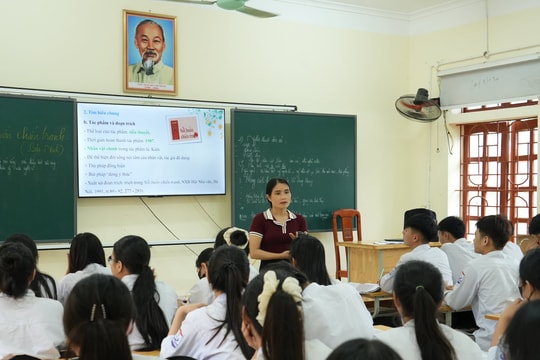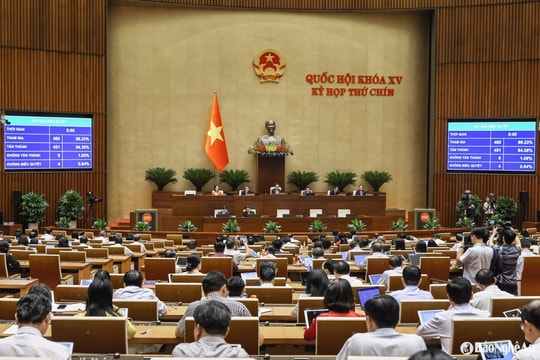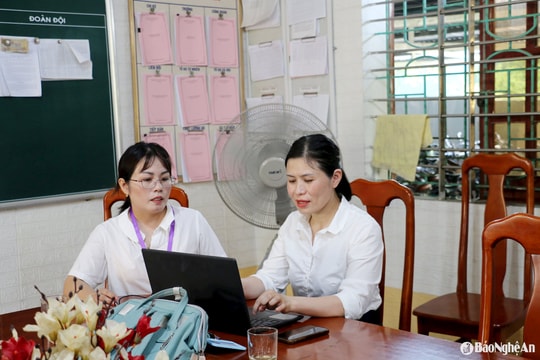Quantifying 'nobility'!
The Ministry of Education and Training is seeking comments on the new Draft Decree on teachers' salaries and allowances. Through practical regulations, we quantify "respect for teachers", creating a foundation for appropriate treatment for the position of teachers.




Honored by special salary coefficient
November comes, reminding us of the tradition of "respecting teachers", but also pointing out the existence and shortcomings over the years: We honor teachers with the most beautiful words, but let them struggle with the problem of "making ends meet". That "nobility", therefore, sometimes becomes fragile... It causes many teachers to leave the podium, makes many of the best students hesitate to choose pedagogy, and somewhere invisibly creates a negative corner in the educational environment.
Therefore, when the Ministry of Education and Training announced the draft Decree regulating the new salary and allowance policies for teachers, right before the Vietnam Teachers' Charter Day on November 20, this was not simply news about policy. Many people considered this an important cultural signal. For the first time, it seems that we are making the most systematic and drastic effort to "quantify" nobility with specific legal regulations. This policy proposal is a pivotal step to bring the status of teachers from a spiritual symbol back to a commensurate material value, in line with the policy that "teachers' salaries are ranked highest in the administrative career salary scale system".
In fact, for a long time, we have been used to using the yardstick of a regular administrative officer to apply to a profession with the highest specificity - the profession of "growing people". That is because, pedagogical work does not end when the school bell rings; after office hours, they are also responsible for preparing lesson plans until late at night, facing invisible pressure from hundreds of parents' eyes and the expectations of society every day. This draft Decree has dared to look straight at that truth and proposed a "breaking ice" solution, which is to apply a "special salary coefficient". According to the draft, all teachers are entitled to this coefficient. Specifically, preschool teachers - those who are under the greatest work pressure, holding the roles of aunts, mothers and service staff - are entitled to 1.25 compared to the current salary coefficient. Other teacher positions are entitled to 1.15.
The new salary calculation formula according to the draft will be:Salary = Basic salary x Current salary coefficient x Special salary coefficient.Mathematically, this is a significant increase. But from a cultural perspective, its significance is much greater. The number 1.15 or 1.25 is not just money, but an official recognition by the State and society that the work of teachers is special and must be treated specially.
The new salary calculation formula according to the draft will be: Salary = Basic salary x Current salary coefficient x Specific salary coefficient.
This is a necessary fairness. We cannot demand absolute devotion from a teacher while paying them a salary that is not enough to regenerate their labor, not enough for them to feel secure in supporting their family. When teachers are "liberated" from financial worries, they can wholeheartedly maintain the "nobility" of their profession. When they can live on their salary, negative factors such as rampant extra teaching or "envelope" pressure will automatically be pushed back. In other words, verbal honor is of course very important, but honoring them with a policy that ensures they can live and live well is the most sustainable material foundation for the position of teachers in modern society.
Restore academic standing and honor sacrifice
If the "special coefficient" solves the "living" problem for the majority of teachers, the other two provisions in the draft touch the depth of the culture of "respect for education" and "gratitude". First, it is the repositioning of the position of professors. For a long time, a leading professor, a professional leader and a pioneer of new knowledge, can still be "leveled" in the administrative career salary scale. This draft clearly stipulates that teachers appointed to the title of professor are subject to the senior expert salary scale, with 3 outstandingly high salary levels (8.8 - 9.4 - 10.0). As the Ministry of Education and Training explains, Professors are similar to senior experts. This is not only a financial decision, but also an academic boost. It restores the "leading" position to elite intellectuals, affirming that they are national assets, with a role equal to the most senior experts in the system. This is the highest manifestation of the culture of "respecting talented people", creating real motivation for scientists to strive, contribute and serve the country.
.jpg)
The second is the humane "reservation" policy. The image of the teacher is not only associated with the podium in the city, but also a symbol of silent sacrifice in remote, border and island areas. They are the ones who "carry letters up the mountain", accept being away from their families, living in deprived conditions to sow the seeds of knowledge. But the ironic reality is that when they complete their tasks and are transferred back, or transferred between facilities, they are immediately cut off from their special allowances, causing their income to suddenly drop. The draft Decree has thoroughly resolved this "bottleneck". When teachers are transferred between educational facilities where the destination has lower allowances, they will have their allowances of the place of departure reserved for a maximum period of 36 months. Similarly, if transferred from a school to an educational management agency, the reservation period is 12 months. The number 12 months, and especially 36 months, is not a dry number. It is a "buffer" full of understanding, a practical gratitude, showing respect for contributions, helping teachers feel secure in their work, ready to rotate according to common tasks without having to suffer disadvantages. This is how the policy shows "humanity" and sharing, a beautiful trait in the organization's behavioral culture towards individuals.
In November, the most meaningful and sustainable gift for teachers is policy assurance, so that their "noble" position is built on a solid material foundation. This draft Decree is a big step forward on that journey, demonstrating the effort to harmonize the traditional cultural value of "respecting teachers" with the fair and practical requirements of today's society. When teachers are assured about their lives, they will have enough mental and physical strength to perform their duties, and that is the most sustainable investment for the future of the country.






.jpg)

